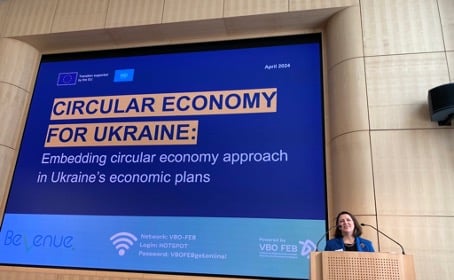The World Circular Economy Forum 2024 (WCEF2024) was the highlight event on the circular economy (CE) this year. It focused on presenting the latest scientific evidence on the most impactful circular solutions and explores on how to turn them from theory to action.
With war in Ukraine and massive destructions and debris due to shelling the circular economy concepts, practices and technologies could offer solutions and opportunities for green recovery and reconstruction of Ukraine. This goes in line with the priorities set by the Government of Ukraine for building the country back better reaching to modern, low-carbon, and climate-resilient standards. This discussion on creating circular economy opportunities for Ukraine has been raised in a dedicated accelerator sessionon Ukraine’s circular reconstruction organised by European Commission Directorates General for Neighbourhood and Enlargement Negotiations and United Nations Industrial Development Organisation (UNIDO) with participation Ms. Nadiya Bihun, Deputy Minister from Ukraine Ministry of Economy.
Led by Circular Economy Foundation (Morgane Veillet Lavallée) Technopolis has also joined the discussion on green opportunities for Ukraine from perspective of circular economy. Together with Circular Economy Foundation Technopolis has been working on “Circular economy for industrial development in Ukraine: Baseline report”, commissioned by UNIDO.
Complementing to the findings from the baselines study, some of the general discussions focused on raising attention to construction sector as one of the most important ones for the Green reconstruction of Ukraine. This is also where circular economy practices could be used for several instances. For example, in relation to energy-efficiency, re-use of secondary material, especially debris, and application of wider EU standards and regulations. Beyond this sector, CE is able to create tremendous opportunities across various other sectors to re-building Ukraine in green and modern way. Moreover, many companies are interested in taking up technologies and CE practices. In particular, because CE practices can serve the industry needs (increase their competitiveness, create jobs, return people to Ukraine).
Some concrete actions for the future facilitating CE adoption in Ukraine, could include: i) supporting with capacity building on the regional/municipal level, ii) sharing existing practices in Ukraine in adoption of CE (incl. relevant standards and regulations), iii) setting regulatory framework (esp for second level recycled materials), and iv) providing access to technology (and funding for SMEs) from EU on recycling of war construction/building waste in Ukraine.

